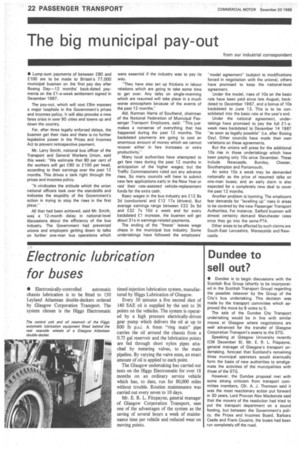The big municipal pay-out
Page 24

If you've noticed an error in this article please click here to report it so we can fix it.
from our industrial correspondent
• Lump-sum payments of between £80 and £100 are to be made to Britain's 77,000 municipal busmen on the first pay day after Boxing Day-12 months' back-dated payments on the 61-a-week settlement signed in December 1967.
The pay-out, which will cost £6m exposes a major loophole in the Government's prices and incomes policy. It will also provoke a new fares crisis in over 90 cities and towns up and down the country.
For, after three legally enforced delays, the busmen get their rises and there is no further legislative power in the Prices and Incomes Act to prevent retrospective payment.
Mr. Larry Smith, national bus officer of the Transport and General Workers Union, said this week: "We estimate that 80 per cent of the workers will get £80 to £100 per head, according to their earnings over the past 12 months. This drives a tank right through the prices and incomes policy.
"It vindicates the attitude which the union national officers took over the standstills and indicates the stupidity of the Government's action in trying to stop the rises in the first place."
All that had been achieved, said Mr. Smith, was a 12-month delay in national-level discussions about the efficiency of the bus industry. The Government had prevented unions and employers getting down to talks on further one-man bus operations which were essential if the industry was to pay its way.
"They have also set up frictions in labour relations which are going to take some time to get over. Any talks on single-manning which are resumed will take place in a much worse atmosphere because of the events of the past 12 months."
Ald. Norman Harris of Southend, chairman of the National Federation of Municipal Passenger Transport Employers, said: "This just makes a nonsense of everything that has happened during the past 12 months. The backdated payments are going to cost an enormous amount of money which we cannot recover either in fare increases or extra productivity."
Many local authorities have attempted to get fare rises during the past 12 months in anticipation of the higher wages; but the Traffic Commissioners ruled out any advance rises. So many councils will have to submit new fare applications early in the New Year or raid their rate-assisted vehicle-replacement funds for the extra cash.
Basic wages in the bus industry are 612 8s 3d (conductors) and £12 17s (drivers). But average earnings range between £22 3s 5d and £32 7s 10d a week and for every backdated £1 increase, the busmen will get about 31s in earnings-related payments.
The ending of the "freeze" leaves wage chaos in the municipal bus industry. Some undertakings have followed the employers' "model agreement" (subject to modifications forced in negotiation with the unions), others have promised to keep the national-level agreement.
Under the model, rises of 10s on the basic rate have been paid since late August, backdated to December 1967, and a bonus of lOs backdated to June 13. This is to be consolidated into the basic rate at the year's end.
Under the national agreement, undertakings have promised to pay the full £1-aweek rises backdated to December 14 1967 "as soon as legally possible" (i.e. after Boxing Day). Other councils have made their own variations on these agreements.
But the unions will press for the additional 10s rise in those undertakings which have been paying only 10s since December. These include Newcastle, Burnley, Chester, Southampton and Portsmouth.
An extra 10s a week may be demanded nationally as the price of resumed talks on one-man buses; and an early claim is also expected for a completely new deal to cover the past 12 months.
Another problem is looming. The employers fear demands for "levelling up" rises in areas to be covered by the new Passenger Transport Authorities. For instance, Salford busmen will almost certainly demand Manchester rates once they go into the same PTA.
Other areas to be affected by such claims are South-East Lancashire, Merseyside and Newcastle.


























































































